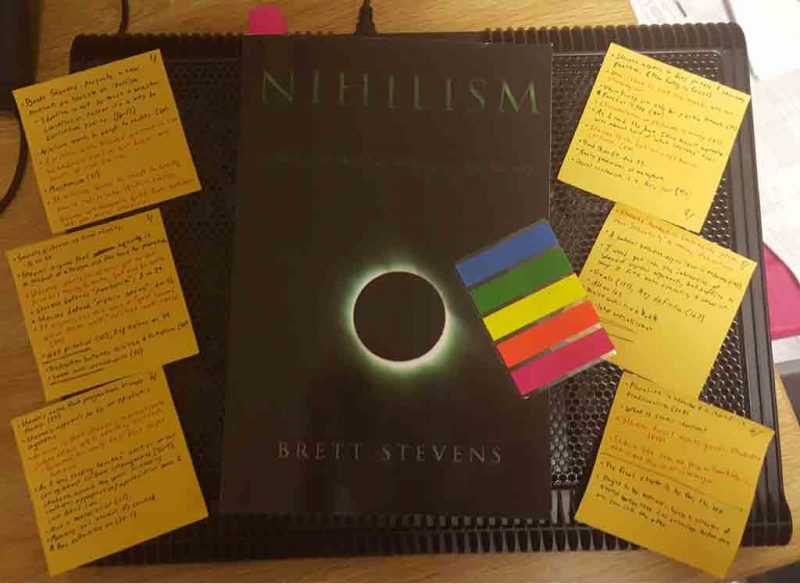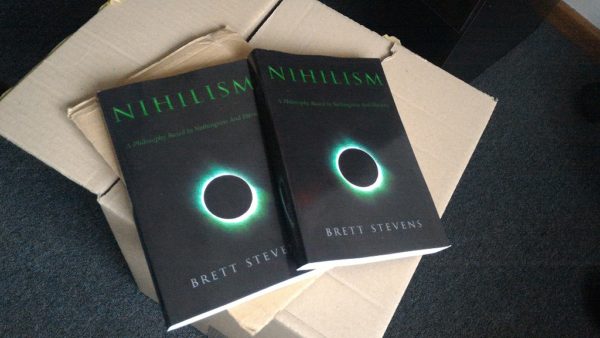An Excellent Review Of “Nihilism”
Jason Goldberg has written a most excellent review of Nihilism: A Philosophy Based In Nothingness And Eternity. In it, he discusses the ideas of Nihilism from a philosophical standpoint. Since the original site has gone down, you can find the full review replicated here:
Brett Stevens’ Nihilism: A Philosophy Based In Nothingness And Eternity1 serves as both an attempt to clarify a long misunderstood term — nihilism — while also critiquing the caricature of nihilists as fatalists. Further, Stevens attempts to reinvigorate the realism-idealism debate with novel insights into the meaning of both terms. What follows is not simply a generic Amazon.com review, but rather a critical analysis of Stevens’ arguments…so if you’re ready to take the plunge, read on.
Nihilism: A Philosophy Based In Nothingness And Eternity is a collection of Stevens’ essays that are divided up into three chapters: Nihilism, Realism, and Transcendentalism. Each chapter features a collection of essays, not any chronological order, that relate to the overall theme of the chapter. Before we get into the nitty-gritty analysis, I would like to note a few things. First, and most importantly, is that I came at Nihilism from a stricter philosophical standpoint than I believe Stevens intended for readers to. More specifically, being trained as a philosopher I look for specific, nuanced, and in-depth arguments to support a point. Stevens, however, takes a slightly different approach arguing that pragmatism tends to trump theory when he says “the pragmatic effects of nihilist belief are more important than detailed philosophical proofs.”2 As such, I tend to agree with about 50% of what Stevens says while finding other parts lacking in explication. All that is not designed to make a normative judgement, however; instead I wish to recognize my biases before going any further. Second, the fact that the essays are not presented in chronological order makes it slightly difficult to trace the evolution of Stevens’ thought and thus a lot of the same material, specifically in the first chapter, is retreaded without further expansion. In other words, essay #1 might define nihilism in a significantly more robust way than essay #3 does which, ultimately, makes tracing the changes in Stevens’ thinking difficult.3 Given that, this review will attempt to aggregate Stevens’ views and distill the main ideas.
All that being said, I would recommend Stevens’ book to anyone who wants to know more about nihilism without reading a generic textbook definition or slugging through Nietzsche, Cioran, and others.
So let us get into the details, shall we?
There are two theses associated with Stevens’ renewal of nihilism as a legitimate philosophical position: a defense of ontological realism (with an implicit critique of dualism) and a critique of fatalism. We shall discuss each in order. For Stevens, nihilism is fundamentally an ontologically realist philosophy inasmuch as it rejects all human constructions of the world as mere phantasms and wants a literal ‘return to the things themselves.’4 Idealism — that is to say the philosophical position that objects in the world are either existentially or epistemologically contingent upon human thought — is rejected, as the embedded assumption within it is the inherent truth of the human mind’s interpretation of the world. Nihilism wants to reject that by noting that inherent truth (or meaning) does not exist;5 all that does is an external world with an objective reality. As such, for Stevens, “[m]eaning is the attempt to mold the world in our own image” to aid in our making sense of a potentially unknowable reality.6 Stevens sums up the realism of nihilism in two brilliant paragraphs:
As a nihilist, I recognize that meaning does not exist. If we exterminate ourselves as a species, and vaporize our beautiful world, the universe will not cry with us (human anticipation of this result is a condition called the pathetic fallacy). No gods will intervene. It will just happen and then — and then the universe will go on. We will not be remembered. We will simply not be.
[…]
A tree falling in a forest unobserved makes a sound. The forest may not recognize this as a sound because a forest is many life forms interacting, not organized by some central principle or consciousness. They just do what they do. In the same way, playing Beethoven’s Ninth Symphony to a bowl of yeast will not elicit a response. The insensate remain unobservant, much like the universe itself.7
What’s especially unique about Stevens’ thought are the qualifications he adds to his affirmation of realism. He fully embraces ontological realism — that is to say, the position that a world exists completely externally and independently of a human mind — while, seemingly, remaining agnostic on the question of epistemological realism — that is to say, whether our “representations and language are accurate mirrors of the world as it actually is.”8 More specifically, Stevens acknowledges that an objective, external world exists, but when the question of whether our knowledge of the world (or as Stevens would put it, our “adaptation to the world”) reflects the world as it actually is, that appears to be a fundamentally unanswerable question.9
Instead, Stevens advocates the individual embracing how she sees the world (the “truth” of the world) and going from there. Following an evolutionary psychological view, if that interpretation of world lines up with what is needed for an individual to survive, then that individual understands reality as it is. In other words, nihilism is “the scientific method with a desire to remove the scientist.”10
Without getting into the nuances of Stevens’ critique of labor specialization, he points out that the need for nihilism stems from a denial of reality due to increased socialization and societal growth. Specifically, “[a]s a society grows, more intermediaries like the law, economics and morals serve to interpret nature for it. These interpretations reflect their interpreters more than their subject, which causes a gradual growth of illusion.”11 To counter this, Stevens wants us to throw out all the old dogmas we’ve been taught and approach the world from a pre-critical, realist lens.
The second main thesis of Stevens’ philosophy is a distinction between nihilism and fatalism; the latter of which he launches a scathing critique at. Fatalism is, according to Stevens, the Hollywood-style nihilism espoused by trendy teens who want an excuse to do nothing all day by virtue of saying “we have no control over the outcome of our actions” so let us not even try.12 Specifically, fatalism, according to Stevens, posits that since truth isn’t inherent, there is no point in trying at all because, as the fatalist will say, “nothing has meaning, so nothing will have meaning for [me] personally.”13 A fundamentally defeatist attitude, this view of the world is antithetical to the affirmation of a meaningless life asserted by Nietzsche or Camus. What’s more, as Stevens notes, fatalism is still beholden to some desire for an objective standard of truth inasmuch as the fatalist avoids action because she receives no recognition for her “correct” action; she, like all the other anti-realists, want to feel externally justified in their actions.14
This view is contrasted with nihilism which takes the same starting point of embracing a lack of inherent truth or meaning, but instead of giving up, advocates for the affirmation of life by encouraging the individual to engage with, and adapt to, reality and create their own truth based on the reality they engage with. Ultimately, nihilism, for Stevens, is a re-styled version of a Nietzschean affirmation of life whereby inherent rules are rejected in favor of the one true rule: reality.
At the end of the day, I have a few comments I would like to reiterate regarding the writing style of Nihilism as well as a few critiques I would like to level. First, when a book is a collection of essays, I think the essays ought to be in chronological order and/or follow the order of an evolution of an idea. The reason for this is simple: it makes understanding the author’s view simpler. As noted above, if the first dated essay, “Belief In Nothing” (written in 2010), explains nihilism more robustly than, say, the second dated essay, “How Does A Nihilist Live?” (written in 2004), the second essay almost falls on deaf ears and almost certainly runs together with the first.15
Second, and specific to Nihilism, is that the three chapters seem discontinuous with each one feeling like an isolated book. Once I was finished reading Nihilism in its entirety, I felt that there were, at least, three different books packed into 278 pages. Further, some essays, namely “The Failure of Liberal Democratic States” and “Surviving Multiculturalism” seemed oddly out of place and, in my opinion, deserved their own book or longform essay where the ideas were expanded upon more robustly than could be done in 20 pages. Finally, while being by far the best chapter, I felt as if chapter three (“Transcendentalism”) did not belong and, much like the aforementioned essays, warranted its own book or longform essay. All that being said, Stevens’ writing style is easily digestible, fun to read, and makes excellent use of metaphors (far better than I have seen in most books of philosophy).
The two critiques I would like to level at Nihilism would be thus: socialization and a subsequent drift from reality is inevitable and subjectivity, a concept Stevens strongly opposes, does not mean different views are “beyond criticism.”
First, Stevens argues that we have drifted away from reality due to a process of increased socialization and growth.16 I worry that this drifting away is an inevitably, however, as humans are fundamentally social creatures which means that some semblance of society will pop up and some kind of collective understanding of the world will emerge. Further, Stevens seems to tacitly admit this when he advocates for an “organic society” that arises naturally and is a response to a specific environment.17 A point of rejoinder could be that these societies are fundamentally nihilistic insofar as they embrace reality, but there is no guarantee of that (especially considering Stevens’ approach to human societies is not only very pluralistic in nature18 but also affirmative of different adaptations to reality insofar as Stevens notes that these various societies “adapt to reality using their specific method”18 — the latter meaning that some societies will embrace a view of reality that Stevens might find illusory).
Second, Stevens rails against human subjectivity by arguing that it creates a world where individuals cannot be criticized as their views are their own opinions and are simply subjective.20 While I am sympathetic to this concern, I do not think that is the outcome of human subjectivity. Subjectivity is merely an acknowledgement of different epistemologies, not an insulation from criticism. Further, I think Stevens’ own normative judgements within Nihilism about what is important and what isn’t, what people waste their lives on and what they don’t, etc. prove that subjectivity still allows for criticism.
Finally, I want to reiterate and expand upon what I said above: I think Brett Stevens’ Nihilism: A Philosophy Based In Nothingness And Eternity is a worthwhile book for any student of philosophy to read insofar as it provides novel insights into what nihilism actually is, critiques misunderstandings of nihilism, and is certainly more readable than other great nihilist authors. Despite my qualms with specific aspects of the book (a professor, friend, and mentor of mine once said that the highest praise one philosopher can give another is to disagree with him), I urge any interested parties to put away their textbooks and sentence definitions of nihilism and read Stevens’ book.
- Brett Stevens, Nihilism: A Philosophy Based In Nothingness And Eternity (Australia: Manticore Press, 2016).
- Stevens, Nihilism: A Philosophy Based In Nothingness And Eternity, 54.
- To contrast, Graham Harman’s excellent book Towards Speculative Realism is a series of essays and lectures published chronologically and show a clear change evolution in thought.
- See “The Eternal Circle” in Nihilism: A Philosophy Based In Nothingness And Eternity, 194-198.
- Stevens, Nihilism: A Philosophy Based In Nothingness And Eternity, 70-71.
- Ibid., 46.
- Ibid., 45-46.
- Levi Bryant, The Democracy of Objects (Ann Arbor: Open Humanities Press, 2011), 18.
- Stevens, Nihilism: A Philosophy Based In Nothingness And Eternity, 78-79.
- Ibid., 162.
- Ibid., 24.
- Ibid., 67.
- Ibid., 45.
- Ibid.
- Further, if only for the sake of a reviewer, it makes re-reading the book to find various passages extremely difficult. It also makes the reference section of this review look odd insofar as I am citing things from all around the book with no discernible order.
- See “Love and Nihilism: A Parallelism Primer” in Nihilism: A Philosophy Based In Nothingness And Eternity, 21-36.
- Ibid., 32-33.
- Ibid., 208.
- Ibid., 33.
- Ibid., 84-85.
It is gratifying — no, inspiring — to see this book receive the kind of detailed analysis and rigorous assessment that is given here. Heft’s analysis brings to light the concepts of Nihilism and contrasts the different perspectives therein. Even if the book is not for you, this may be something enjoyable to read for its exploration of the depth of the issue.
In the meantime, copies continue to arrive to readers. I hope they will enjoy it. If nothing else, it is an intellectual journey into what kills off high-IQ civilizations and how to avoid that. At its best, it is a call to action not just in the world, but in ourselves.
Thank you to all who have joined us on this exploration.
Tags: Books, nihilism, Nihilism: A Philosophy Based in Nothingness and Eternity, philosophy, review













